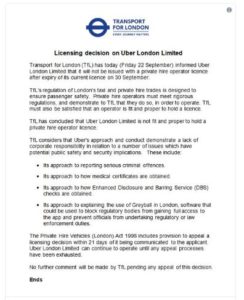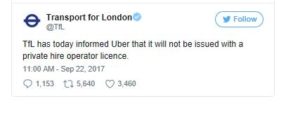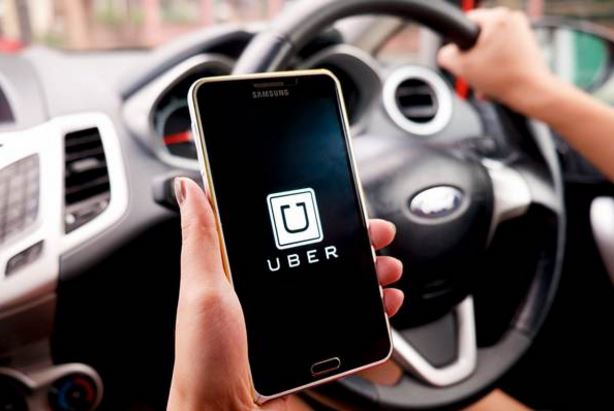Uber has lost its license to operate in London, the capital’s transport regulator has said. Transport for London (TfL) announced that Uber would not be issued with a private hire operator’s license once its current licence is up on 30 September. Uber said it will challenge the decision in court. It’s a major blow for the ride-hailing company, which is hugely popular among Londoners. The city is its biggest market in the UK, with around 40,000 registered drivers in the capital, according to the firm’s own figures.
TfL said Uber was not “fit and proper” to hold a licence, and said the firm’s approach to reporting serious driver offences, approach to driver medical and safety checks, and use of its secret “Greyball” software to dodge transport officials all contributed to its decision. This doesn’t actually mean Uber will stop operating in London after September 30, according to TfL’s statement. The firm has 21 days to appeal the decision, and can continue operating in London until that process is exhausted.
Here’s the full text of Transport for London’s announcement:


Transport for London granted Uber a four-month operator’s licence in May, while it made a decision about a longer five-year licence. And here’s what London mayor Sadiq Khan said: “I want London to be at the forefront of innovation and new technology and to be a natural home for exciting new companies that help Londoners by providing a better and more affordable service. “However, all companies in London must play by the rules and adhere to the high standards we expect – particularly when it comes to the safety of customers. Providing an innovative service must not be at the expense of customer safety and security. “I fully support TfL’s decision – it would be wrong if TfL continued to license Uber if there is any way that this could pose a threat to Londoners’ safety and security. Any operator of private hire services in London needs to play by the rules.”
According to Guido Fawkes reporter Alex Wickham Uber wasn’t aware of TfL’s decision until one minute before the regulator tweeted its statement out publicly.
Here’s how Uber reacted to Tfl’s decision:
“3.5 million Londoners who use our app, and more than 40,000 licensed drivers who rely on Uber to make a living, will be astounded by this decision.
“By wanting to ban our app from the capital Transport for London and the Mayor have caved in to a small number of people who want to restrict consumer choice.
“If this decision stands, it will put more than 40,000 licensed drivers out of work and deprive Londoners of a convenient and affordable form of transport.
“To defend the livelihoods of all those drivers, and the consumer choice of millions of Londoners who use our app, we intend to immediately challenge this in the courts.
“Drivers who use Uber are licensed by Transport for London and have been through the same enhanced DBS background checks as black cab drivers. Our pioneering technology has gone further to enhance safety with every trip tracked and recorded by GPS. We have always followed TfL rules on reporting serious incidents and have a dedicated team who work closely with the Metropolitan Police.
“As we have already told TfL, an independent review has found that ‘greyball’ has never been used or considered in the UK for the purposes cited by TfL.
“Uber operates in more than 600 cities around the world, including more than 40 towns and cities here in the UK. This ban would show the world that, far from being open, London is closed to innovative companies who bring choice to consumers.”
Transport for London granted Uber a four-month operator’s licence in May to give itself more time to decide whether to grant a longer five-year licence. But there has been growing pressure on the regulator from black cab driver groups, former Uber drivers, and politicians to ban Uber from London.
They complained that Uber treats drivers poorly, undercuts the black taxi trade, puts passengers at risk, and doesn’t pay enough tax in the UK. They also cite the firm’s toxic corporate culture in the US, which resulted in a change of CEO and massive upheaval at board level this year. Losing its licence isn’t the only major setback for Uber this month. Next week, the company will appeal a November tribunal ruling which determined its UK drivers are “workers”, not self-employed. That means they are entitled to minimum wage and holiday pay — something that could considerably dent Uber’s bottom line in the UK. Uber’s UK arm reported £1.83 million in profit in 2015, according to its most recent accounts.
Source: Business Insider UK



